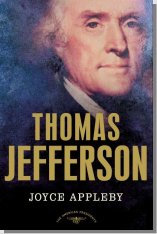|

The American Presidents Series
 |
Thomas Jefferson
By
Joyce Appleby
Published by
Times Books
hardcover
Publication date:
2/1/2003
ISBN:
0805069240
Ordering Information
|
Few presidents embody the American spirit as fully as Thomas Jefferson. He was possessed of an unrivaled political imagination, and his vision accounts for the almost utopian zeal of his two administrations. Jefferson alone among his American peers anticipated the age of democracy and bent every effort toward hastening its peaceful, consensual arrival. He realized that the spirit of democracy required not only a political revolution, but also a social one. Jefferson, of upper-class birth and upbringing, spent much of his presidency laying out a path through the aristocratic prejudices and pretensions that stood in the way of democracy.
The contradictions in his populism are striking and make Jefferson the most controversial of presidents: he spoke of inalienable human rights, but he taught his daughters that women were created for men's pleasure, and he believed that whites and blacks could never coexist peacefully in freedom. Even though his egalitarianism was limited to white men, it represented a sharp break with the outlook and policies of his predecessors. The ideological differences between Jefferson and Federalist presidents George Washington and John Adams led to the establishment of the two-party system that still dominates American politics today.
Jefferson described his election to the presidency as a second American Revolution. For the first time, historian Joyce Appleby, an expert on early America, rigorously explores this claim. She argues that our third president did, in fact, radically transform the political landscape of the United States by limiting the power of the government and eradicating the elitist practices inherited from the colonial era. His struggle to transfer influence from the upper class to the common citizen while limiting the power of the American government created a powerful new vision of liberty and democracy. Politicians, historians, and citizens alike continue to cherish and grapple with the legacy of this quintessentially American reformer two centuries after his rise to the White House.
Reviews
"A portrait of our most controversial Founding Father as a genuine radical . . . Thomas Jefferson was alone among his revolutionary peers in anticipating the advent of American democracy and striving to assure its peaceful birth, the author writes: 'He resisted the notion that political equality was a chimera and strove to root out the last monarchical remnants from American culture,' a project that set him in constant opposition to his privileged peers and particularly in opposition to the Federalist Party, the political organ of their class. Appleby takes quite seriously Jefferson's boast that his election represented 'as real a revolution in the principles of our government as that of 1776 was in its form'; furthermore, she reckons with some amazement that no American with such a radical bent has met with quite the same level of electoral approval as did Jefferson, though it could be argued that we have never achieved his vision of a liberal, democratic America in which the governors and governed alike possessed 'rationality, the drive for self-improvement, the capacity to work independently and to cooperate without coercion.' Jefferson was a dreamer, impractical and torn by contradictions, Appleby allows; what is remarkable is that a man of such resolute devotion to liberty could have emerged from his class and position, even if his notion of liberty kept it the province of white men. For all that, Appleby insists again and again, Jefferson was a true radical whose polished words were not mere rhetorical exercises. When he said, 'I like a little rebellion from time to time. It clears the atmosphere,' he meant it. A useful slap against the reactionaries who today claim descent from Jeffersonian ideals." --Kirkus Reviews
"Appleby has succeeded in writing as good a brief study of this complex man as is imaginable. Another in a series on the American chief executives edited by Arthur M. Schlesinger Jr., her elegant book is a liberal's take on the complex, sphinx-like founder of American liberalism. Appleby convincingly argues that the third president's greatest legacies were limited government (breached, however, by the opportunism that characterized his own presidency) and the great expansion of democracy . . . She fully explains the man's sorry record and tortured views on slavery and race. Providing along the way a short, up-to-date history of the early 19th-century nation, she also concisely surveys the day's great issues-voting, democracy, political parties, commerce, westering and religion." --Publishers Weekly
Thomas Jefferson is available at all fine bookstores.
Here are some links to help you.

 
|
